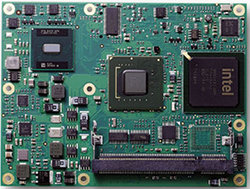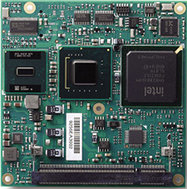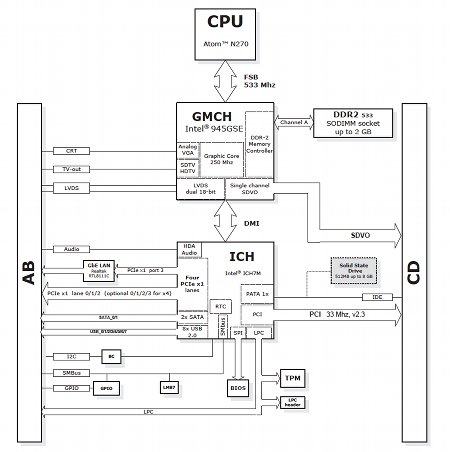Atom-based COM Express module shrunk in the wash
Sep 11, 2009 — by LinuxDevices Staff — from the LinuxDevices Archive — 1 viewsAdlink has announced an “entry level” COM Express module for medical, automation, test, and industrial control applications. The Express-ATC includes a 1.6GHz Atom N270 processor, three PCI Express x1 lanes, gigabit Ethernet, two SATA ports, and optional SSD (solid state disk) storage up to 8GB, the company says.
If nothing else, Adlink's new Express-ATC provides an object lesson in how rapidly computing devices continue to shrink, since it offers substantially the same functionality as the company's Express-AT, a COM Express Type 2 board the company released just last fall. The Express-AT (below left) has the same Intel Atom N270 processor, 945GSE northbridge, and ICH7-M southbridge, but measures 4.9 x 3.7 inches (125 x 95mm), whereas the Express-ATC (below right) comes in the 3.7 x 3.7 (95 x 95mm) COM Express Compact format.


Adlink's Express-AT (left) and Express-ATC (right)
(Click either to enlarge)
The Express-ATC retains the same interface connector design and pinout, ready to relay all of its signals to the outside world via an application-specific baseboard. According to Adlink, the Express-ATC offers three PCI Express x1 lanes, and is optionally available with 4 x1 lanes (also configurable as 1 x4). Other expansion buses include 32-bit PCI, LPC, SmBus, I2C, and SDVO (serial digital video output), the company says.
The Express-ATC has two SATA-150 ports, IDE (PATA), eight USB 2.0 ports, and gigabit Ethernet, the company says. Analog CRTs with resolutions up to 1600 x 1200 pixels, single or dual LVDS-interfaced displays, and NTSC/PAL HDTV output are all supported, Adlink adds.
A single DIMM socket on the Express-ATC can accept up to 2GB of DDR2 memory, the maximum supported by its chipset, and the module is optionally available with an IDE-based SSD (solid state drive) in capacities from 1GB to 8GB, says Adlink. Operating system support is said to include Linux 2.6, Windows XP, Windows CE, and Windows Vista.

A block diagram of the Adlink Express-ATC
(Click to enlarge)
Adlink pegs power consumption for the Express-ATC at nine Watts, with 1GB of RAM installed. The device apparently runs fanlessly, but the company lists both a heat spreader and a low-profile heatsink as available options.
Features and specifications listed by Adlink for the Express-ATC include the following:
- Processor — 1.6GHz Atom N270
- Memory — Up to 2GB of DDR2 RAM via single DIMM slot
- Storage — Optional onboard, IDE-interfaced SSD from 1GB to 8GB
- Networking — Gigabit Ethernet
- Other I/O:
- 8 x USB 2.0
- IDE
- 2 x SATA-150
- CRT, TV, and LVDS
- HD or AC '97 audio
- Expansion buses:
- 3 PCI Express x1 (standard)
- 4 PCI Express x1 or 1 PCI Express x4 (optional)
- 32-bit PCI 2.3 at 33MHz
- LPC
- SMBus
- I2C
- Power — 12VDC; 9 Watts with 1GB of RAM
- Operating temperature — 32 to 140 deg. F (0 to 60 deg. C)
- Dimensions — 3.74 x 3.74 inches (95 x 95mm)
Availability
Adlink did not release pricing or availability specifics for the Express-ATC, but the device appears to be available now. Further information may be found on the company's website, here.
This article was originally published on LinuxDevices.com and has been donated to the open source community by QuinStreet Inc. Please visit LinuxToday.com for up-to-date news and articles about Linux and open source.